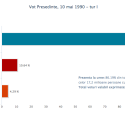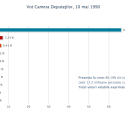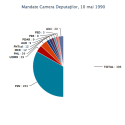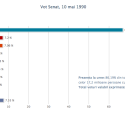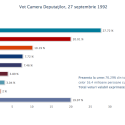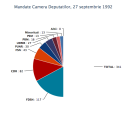1. 2013 – ONE YEAR OF ECONOMIC GROWTH. In the third quarter of 2013, Romania had the highest economic growth in the EU and one of the most important EU economic growths in 2013 (+2.7 % of GDP). The effect is due to the job increase with 66,000, after a few years when the number of companies was declining and 700,000 jobs were dissolved. The macroeconomic figures are good (halved deficit of targets agreed with the EU and the IMF), Romania borrows at the lowest interest rates, and rating agencies have improved Romania’s country rating. Industrial production growth in the EU hit a new record (for example, growth in car production – highest in Europe), agricultural production and exports are at record highs due to the measures taken by the Government. In 2013, Romania has the highest GDP and the lowest inflation rate, since the Revolution. The USL Government reduced the compliance burden. The 2013 Doing Business report, made by the World Bank, shows a reduction in the number of tax payments per year from 113 in 2012 to 41 in 2013. The Government has increased the economy by continuing fiscal consolidation and by implementing social protection measures for vulnerable groups. Following the optimal policy mix, Romanians’ rates on loans taken from banks began to drop. The Leu-Euro exchange rates are stable!
2. 2013 – THE EUROPEAN FUNDS BET – WON. Romania has absorbed in one year more than in the past 6 years! Romania has reached 30% in cohesion funds, including unblocking of all programs stopped due to corruption of previous Governments and 67% in agriculture funds via NRDP. This year, Romania has attracted 5.5 billion Euros from the EU, for several million beneficiaries.
3. 2013 – ONE YEAR OF SOCIAL REPAIRS. The Government has increased pensions over the inflation rate, for the first time since many years, and we gave the budgetaries their money back, bringing their wages back to the level before the 2010 cuts. We will continue indexation above inflation rate also next year, in January, if the budget law will come into force. There were paid arrears (debts older than 90 days) of over 2.6 billion Lei for drugs; there were paid arrears of about 1bn Lei at local authorities’ level.
4. 2013 – ONE YEAR OF SUPPORT FOR EDUCATION. The Government has made important steps towards supporting education and research – starting the Eli Magurele project, bringing internet connections to more than 2,500 schools in the country side, introducing digital textbooks, have research/development projects in IT worth more than 150 million Euros, doubling the number of PE classes in school and, from 2014, supporting beginning teachers with higher salaries.
5. 2013 – ONE YEAR OF SUPPORT FOR HEALTH – The Government has reopened closed hospitals, expanding nationwide the SMURD system, resuming vaccine domestic production, unblocking jobs in the system.
6. 2013 – A GOOD YEAR FOR AGRICULTURE. Romania has absorbed 2.7% billion Euros, and has reached a 67% absorption rate in the NRDP. At the same time, the Government has successfully reduced the VAT ON BREAD, prices falling by 12%, according to official statistics; full subsidies have been paid, and record yields were registered in several categories. The Government has started European projects for the irrigation system rehabilitation, and has also started the building of warehouses for fruits and vegetables, taking over of domestic production, in order to stimulate organic farming.
7. 2013 – THE YEAR OF IMPORTANT REFORMS. Major steps were taken in the issue of property restitution and of the fight against restitution mafias. The project concerning the decentralization of Romania was finalized, through a law that supports the local authorities. The Fiscal institutions have been reformed, in order to combat evasion and increase revenues (effect: for the first time, in October and November, the state has received revenues over the projected levels).
8. 2013 – CARING FOR THOSE IN NEED, THOSE AFFECTED BY THE PAST CRISIS – The Government has increased the amount of heating aid for vulnerable families; at the same time aid for attendants of disabled persons has been reintroduced. The minimum wage increased by 15%. 2013 has seen increased pensions and a rise of the guaranteed minimum income.
9. 2013 – EXITING THE FOREIGN POLICY ISOLATION – The USL Cabinet has strengthened external partnerships and, as a result, has attracted foreign investors in order to help create jobs in major industries such as IT, auto, pharmacy, agro and infrastructure. 2013 was the year of important official visits to the U.S., China, France, Germany, Italy and many other major countries in the EU. The largest investment forum was held in Romania. One effect of this year – the attracted investments in the economy (actual or future employed, based on agreements and memoranda from internal and external sources, public and private funding – but all discussed, agreed and started this year) will exceed 10 billion Euros by the end of the year, a record figure for the post-Revolution period.
10. 2013 – ONE YEAR TO STRENGTHEN THE ANTI-CORRUPTION FIGHT – 364 criminal complaints were made to the NDA, the Prosecutor’s Office and other institutions, in order to investigate the irregularities in the past years. The independence of the judiciary was maintained, larger budgets were allocated to the institutions in the fight against corruption (i.e. NAI and NDA).
11. 2013 – ONE YEAR OF SUPPORTING MAJOR PROJECTS: The USL Government inaugurated, by the end of 2013, about 240 km of HIGHWAY, out of over 600 existing km, and will start new projects (Comarnic-Brasov). Work was resumed on the UNDERGROUND line in Drumul Taberei. Large research projects were also initiated (ELI Magurele).
12. 2013 – AN IMPORTANT YEAR FOR ROMANIA’S ENERGY INDEPENDENCE. Bringing Hidroelectrica on profit, after last year’s insolvency, and ridding the company of ‘smart alecks’. The energy bill for the population was reduced by 5%, postponing a quota of green certificates for renewable energy producers. The Government has also completed the listing of Romgaz on the London Stock Exchange. Work was started on the Ungheni-Iasi pipeline; and investors were attracted for other major investment projects in energy.



